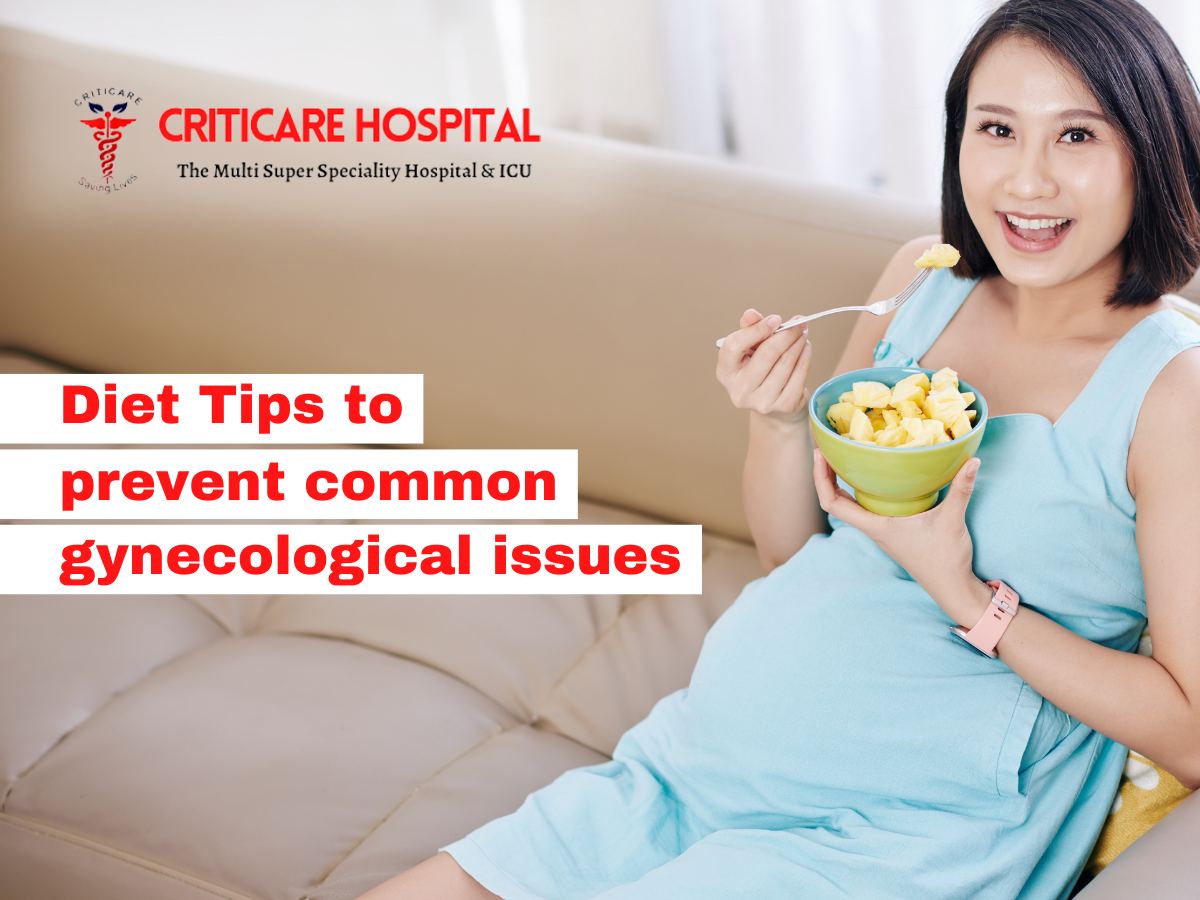Good gynecological health is essential for women at all stages of life. However, many women experience common gynecological issues such as irregular periods, painful periods, and infections throughout their lives. While these issues can have several underlying causes, diet plays a significant role in gynecological health. Consuming a healthy, balanced diet can help prevent these issues and promote reproductive health. In this blog post, we will discuss effective diet tips to prevent common gynecological problems.
Understanding the Link Between Diet and Gynecological Health
Diet plays a significant role in women’s reproductive health due to its impact on hormones and inflammation levels. Consuming a balanced diet with plenty of whole foods, fruits, and vegetables can help regulate estrogen levels and lower the risk of gynecological issues.
On the other hand, diets that are high in processed foods added sugars, and unhealthy fats can disrupt hormone levels and increase inflammation, putting women at greater risk for gynecological problems.
Research shows that a healthy diet can prevent common gynecological issues such as menstrual irregularities, ovarian cancer, endometriosis, bacterial vaginosis, and yeast infections. This is because the food we eat affects our gut health, which in turn impacts our vaginal health and menstrual cycles.
The Role of Hormonal Balance in Gynecological Health
One of the critical factors in maintaining gynecological health is hormonal balance. Imbalances in hormones, especially estrogen, can cause a range of reproductive issues such as menstrual irregularities, ovarian cysts, and fibroids.
The diet plays a crucial role in regulating estrogen levels. Foods rich in phytoestrogens like tofu, flaxseeds, sesame seeds, lentils, beans, and whole grains can help balance estrogen levels in the body. Vitamin D is also essential for reproductive health and can be found in fatty fish like salmon and egg yolks.
The Impact of Gut Health on Gynecological Issues
A healthy gut is crucial for gynecological health, as imbalances in gut flora can lead to infections like bacterial vaginosis and yeast infections. Probiotic-rich foods like yogurt and kefir can help balance gut bacteria and prevent these infections. A high-fiber diet with plenty of prebiotic-rich foods, including garlic, onions, and asparagus, can also support gut health and prevent gynecological issues.
Reducing Inflammation Through Diet to Prevent Gynecological Problems
Inflammation is a contributing factor to gynecological issues such as ovarian cancer, endometriosis, and cervical cancer. Eating an anti-inflammatory diet can help prevent these issues by reducing inflammation levels in the body. Foods rich in anti-inflammatory compounds, including turmeric, ginger, and leafy green vegetables, can help lower the risk of these cancers. Women with endometriosis should avoid inflammation-triggering foods, including red meat, dairy, and gluten, and focus on consuming anti-inflammatory foods to manage symptoms.
The Role of Antioxidants in Preventing Gynecological Issues
Antioxidants can help prevent gynecological issues by neutralizing harmful free radicals that can damage reproductive cells. Foods high in antioxidants, such as berries, dark chocolate, and green tea, can protect against ovarian and cervical
cancer. Women should aim to consume a variety of colorful fruits and vegetables to ensure they get a broad range of antioxidants and other vital nutrients.
Foods to Eat for Hormonal Balance
Consuming a balanced diet with plenty of whole foods, fruits, and vegetables can help regulate estrogen levels, improve reproductive health, and reduce the risk of gynecological issues. Here are some foods that can help with hormonal balance:
1. Phytoestrogen-Rich Foods
Phytoestrogens are plant compounds that can mimic the effects of estrogen in the body. Incorporating these foods into your diet can help balance estrogen levels:
- Tofu and soy products
- Flaxseeds and chia seeds
- Tempeh
- Lentils
2. Vitamin D-Rich Foods
Vitamin D is essential for reproductive health and can reduce the risk of ovarian cancer. Here are some foods that are high in vitamin D:
- Salmon and other fatty fish
- Egg yolks
- Fortified cereals and milk alternatives
3. Omega-3 Fatty Acid-Rich Foods
Omega-3 fatty acids can reduce inflammation and lower the risk of endometriosis and menstrual pain. Foods rich in omega-3s include:
- Fatty fish like salmon and sardines
- Chia seeds and flaxseeds
- Walnuts
- Spinach
By incorporating these foods into your diet, you can support hormonal balance and improve your reproductive health. Always consult with a healthcare professional and a registered dietitian to develop a personalized eating plan that works for your specific needs and health goals.
The impact of gut health on gynecological issues
A healthy gut is crucial for gynecological health, as imbalances in gut flora can lead to infections like bacterial vaginosis and yeast infections. These infections can cause uncomfortable symptoms like itching, burning, or abnormal discharge.
Consuming probiotic-rich foods, such as yogurt and kefir, can help balance gut bacteria and prevent these infections. Probiotics are live bacteria and yeasts that are good for your gut health and overall well-being. They can help strengthen your immune system and protect against harmful pathogens.
A high-fiber diet with plenty of prebiotic-rich foods, including garlic, onions, and asparagus, can also support gut health and prevent gynecological issues. Prebiotics are a type of dietary fiber that feeds the good bacteria in your gut, allowing them to flourish and keep your digestive system functioning properly.
If you are experiencing gynecological issues, it’s important to talk to a healthcare professional to determine the root cause and develop a plan for treatment. In addition to medical treatment, making dietary changes can also have a positive impact on your
gynecological health.
Reducing inflammation through diet to prevent gynecological problems
Eating an anti-inflammatory diet can help prevent gynecological problems by reducing inflammation levels in the body. When the body is inflamed, it produces more estrogen, which can lead to a variety of gynecological issues. Therefore, following an anti-inflammatory diet can help regulate hormone levels, prevent inflammation, and reduce the risk of gynecological problems.
Foods to eat:
Turmeric: Contains a compound called curcumin, which has anti-inflammatory properties. Adding turmeric to your diet can prevent ovarian and cervical cancer.
Ginger: Contains gingerol, which is a powerful anti-inflammatory agent. Ginger can help reduce menstrual pain and fight off infections.
Leafy green vegetables: High in antioxidants and anti-inflammatory compounds, such as vitamin C and beta-carotene. Adding leafy greens to your diet can help reduce inflammation levels in the body and prevent gynecological problems.
Foods to avoid:
Red meat: Contains high levels of arachidonic acid, which can trigger inflammation in the body.
Dairy: May contain hormones that can disrupt the balance of estrogen in the body, leading to gynecological problems.
Gluten: This can trigger inflammation in the gut, which can lead to imbalances in gut flora and increase the risk of infections.
By following an anti-inflammatory diet, women with gynecological issues can manage symptoms, reduce the risk of future problems, and improve overall reproductive health. As always, women should consult with healthcare professionals and nutritionists to develop a personalized gynecological-friendly diet.
The role of antioxidants in preventing
Gynecological Issues
Antioxidants are essential for maintaining good gynecological health as they protect against harmful free radicals that can damage reproductive cells. Here are some foods to eat for antioxidants:
Berries – Blueberries, raspberries, strawberries, and blackberries are all rich in antioxidants and can protect against ovarian and cervical cancer.
Dark chocolate – High-quality dark chocolate contains flavonoids, which are antioxidants that can help prevent gynecological problems.
Green tea – Green tea is rich in catechins, which are antioxidants that can lower the risk of ovarian and cervical cancer.
Colorful fruits and vegetables – Eating a rainbow of colorful fruits and vegetables can provide a broad range of antioxidants and other vital nutrients for gynecological health.
By incorporating these antioxidant-rich foods into your diet, you can protect against gynecological issues and maintain good reproductive health.
Implementing a gynecological-friendly diet in your daily routine
Now that you understand the importance of diet for gynecological health, how can you implement changes in your daily routine? Here are some tips:
Consult with a healthcare professional and/or a registered dietitian to develop a personalized gynecological-friendly diet plan based on your individual needs and preferences.
Eat small, frequent meals throughout the day to help regulate hormone levels and prevent fluctuations that can lead to menstrual irregularities and other gynecological issues.
Prioritize drinking plenty of water and staying hydrated. Proper hydration can help flush out toxins and keep cells healthy.
Incorporate a variety of whole foods, fruits, and vegetables into your diet to ensure that you are getting a wide range of nutrients and antioxidants. Limit your intake of unhealthy fats and processed foods. Instead, opt for high-quality sources of protein, whole grains, and healthy fats like avocados, nuts, and seeds.
Aim to consume a regular amount of phytoestrogens, vitamin D, and omega-3 fatty acids. You can find these nutrients in foods like tofu, salmon, flaxseeds, sardines, egg yolks, and leafy green vegetables.
Focus on consuming probiotic-rich foods, such as yogurt and kefir, and prebiotic-rich foods like garlic, onions, and asparagus to promote gut health and prevent
infections like bacterial vaginosis and yeast infections.
Finally, remember that a gynecological-friendly diet is a lifestyle change, not a quick fix. Be patient and consistent, and over time, you will reap the benefits of a healthier, happier reproductive system.
Conclusion
By making small changes to your diet, you can help prevent common gynecological issues and promote reproductive health. Eating a balanced diet with plenty of whole foods, fruits, and vegetables can help regulate hormone levels and reduce inflammation in the body. Incorporating specific foods like phytoestrogen-rich foods, vitamin D-rich foods, and omega-3 fatty acid-rich foods can also support reproductive health.
Additionally, focusing on gut health, reducing inflammation, and consuming antioxidants can help prevent gynecological problems. Consult with the best gynaecologist in Lucknow and nutritionist to create a personalized gynecological-friendly diet that suits your needs and lifestyle. Remember to stay hydrated and prioritize drinking plenty of water. With these simple dietary changes, you can maintain a healthy reproductive system and prevent gynecological issues.




